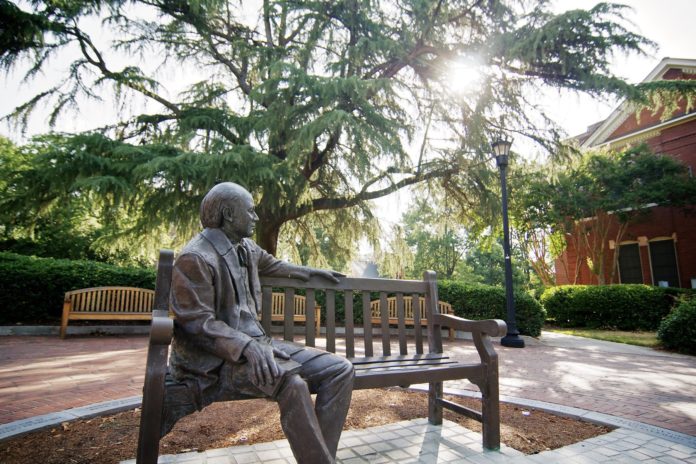MACON, Ga. — The Mercer University School of Engineering has received a $50,000 grant to expand and modify course offerings. The School is one of just five in the country to receive the grant this year from the Kern Entrepreneurship Education Network, sponsored by the Kern Family Foundation. The grant will run for two years, with options for renewals thereafter through a competitive process.
The KEEN program is funded through the support of the Kern Family Foundation and offers institutions access to vital resources for building quality entrepreneurship education programs that engage engineering and technical students in hands-on learning. The goal of KEEN is to make entrepreneurship education opportunities widely available at U.S. institutions of higher learning, and to instill an action-oriented entrepreneurial mindset in engineering, science, and technical undergraduates.
The School, which was founded in 1985, has always encouraged its students to take an entrepreneurial mindset, emphasizing problem solving and inventiveness, said Dean M. Dayne Aldridge. The engineering curriculum currently places a heavy emphasis on projects. Students begin the process with a yearlong first-year design sequence in which they work in teams to build a machine for competition. This emphasis continues into their Senior Design Projects, where they apply their problem-solving skills to real-world situations.
“Our curriculum was designed from the outset to give our students an edge in the engineering world by emphasizing communication, creativity and problem-solving skills,” Aldridge said. “Our students have always been inventive, particularly in their senior design sequence, often helping companies solve problems or seek new solutions to problems. This grant allows the School to take it one step further by giving them the tools to act entrepreneurially within the companies they work for and give them the skills to build their own ideas into businesses.”
The curriculum changes will include an introduction to entrepreneurship during the freshman year as well as a new Entrepreneurship General Education option. The EGE option will be a series of five courses, including three from the Eugene W. Stetson School of Business and Economics – “Principles of Marketing,” “Principles of Management,” and “Entrepreneurship;” a course in the School of Engineering called “Engineering Innovation and Creativity” and the Senior Design Sequence. As part of the EGE option students’ Senior Design Projects will focus on an entrepreneurial technical solution to a real-world problem and will require a full business plan for the project. The projects in this category also will compete for an Entrepreneurship Award. Finally, the School will promote entrepreneurship to all students through lectures, faculty advising and invited presentations.
The Senior Design Projects are a source of the School’s strength and will be further enhanced through this program, Aldridge said. These projects provide valuable opportunities for students to develop skills in project management, working with teams, and frequently result in innovative solutions to business-driven problems. Over the years, several projects have resulted in patents.
“We will incorporate an entrepreneurship emphasis throughout our curriculum as a part of this initiative,” said Dr. Ramachandran Radharamanan, professor of Industrial and Systems Engineering and leader of the project. “We will emphasize entrepreneurship from the beginning of our recruiting efforts, in freshman orientation, through the curriculum and into the culminating engineering experience. We believe this program will provide our graduates with entrepreneur expertise and with an entrepreneurial mind-set for current and new businesses in Georgia and the nation.”
Dr. Ha Van Vo, an assistant professor of Biomedical Engineering, also will be a part of launching and overseeing the program. Ray Crumbley, who has worked for many years with the School on its relationships with area companies for recruiting and senior design projects, has been named the entrepreneurship coordinator as part of the program
Crumbley will work with the National Engineering Advisory Board and Engineering Alumni Board to develop a network of Georgia-based entrepreneurs to serve as advisors to student teams, to conduct guest lectures to student classes, and serve as judges in student project competitions. The School will also help student teams who wish to pursue their ideas as business ventures beyond graduation, by facilitating introductions with specialists from the Georgia Center for Innovation Outreach, a state-supported program that provides help to start-up companies and small businesses that are developing or applying technology in innovative ways.
About the Kern Family Foundation:
Established in 1999, the Kern Family Foundation is a prominent, strategic foundation that invests in the future through values, education and innovation. The Foundation aims to effect systemic change through broad-impact, long-term programs in order to preserve the tradition of private enterprise, which has enabled the American nation to thrive intellectually and economically. Programs include Project Lead the Way, Pastoral Ministry Program, Kern Entrepreneurship Education Network and Education Reform.
About Mercer University and the School of Engineering:
Named one of the top undergraduate engineering schools in the Southeast by U.S. News & World Report for the past nine years, the Mercer School of Engineering is known for producing graduates ready to work in the industry and government. The School’s innovative curriculum emphasizes teamwork as well as opportunities to gain hands-on experiences. Mercer engineering graduates are known for their strong communication skills, as Mercer is one of few engineering institutions in the nation to house a Technical Communication Department within the Engineering School.
Founded in 1833, Mercer University is a dynamic and comprehensive center of undergraduate, graduate and professional education. The University has 7,300 students; 11 schools and colleges – liberal arts, law, pharmacy, medicine, business, engineering, education, theology, music, nursing and continuing and professional studies; major campuses in Macon and Atlanta; four regional academic centers across the state; a university press; two teaching hospitals — Memorial Health University Medical Center and the Medical Center of Central Georgia; educational partnerships with Warner Robins Air Logistics Center in Warner Robins and Piedmont Healthcare in Atlanta; an engineering research center in Warner Robins; a performing arts center in Macon; and a NCAA Division I athletic program. For more information, visit www.mercer.edu.
— 30 —










